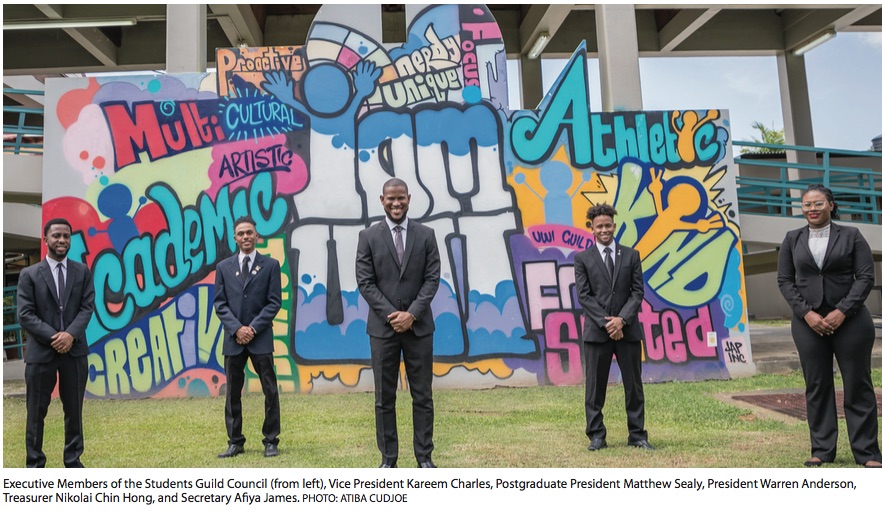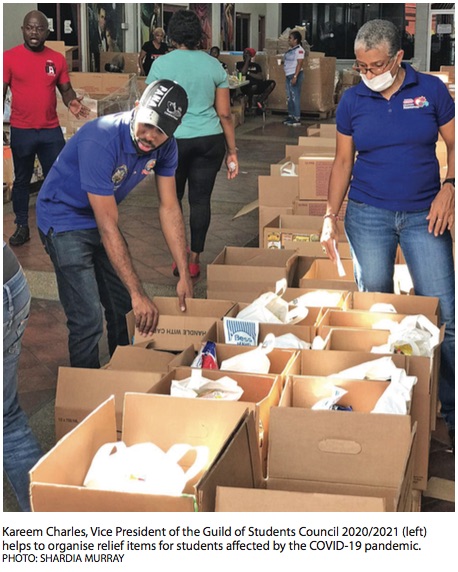New Guild contends with the pandemic to support students in need
On March 5, students of The UWI went into one of three polling stations to vote for their student representatives for the 2020/2021 Academic Year. Leading up to that day, the cadre of student representatives, whose names were printed on the ballot papers, outlined their proposals for advancing students’ interest. At that time, COVID-19 was a distant consideration.
“This pandemic has forced us to rethink what student engagement would look like for this upcoming year and rapidly adjust our means of doing such,” says Kareem Charles, newly-elected Vice-President of the Guild of Students Council.

Usually, the elected guild councillors would begin their engagements around the time of their inauguration, at the beginning of June. This year, however, these students had to hit the ground running as merely a week after the election results were made known, the first case of the novel coronavirus was recorded in Trinidad, and The UWI’s modus operandi was forced to change.
By the time the 26 student leaders on the Warren Anderson-led Guild of Students Council officially took office on June 1, they were already working to ensure that students were catered for, and well-represented.
Charles, who was the International Affairs Committee (IAC) Chairperson on the previous Guild Council, related that his committee provided some tangible relief to students just before final examinations began on May 25. This included supplying students in the halls of residence, many of whom are regional students affected by the closure of borders, with groceries and other essential items.
In addition to providing this relief for the students, these student leaders were the nexus between students and their lecturers, as they navigated the new online learning and assessment platform (and the associated challenges that may have arisen).
Khaleem Ali, the Faculty of Law Representative, emphasises that there must be cognisance of the varying socio-economic realities of each student. And, that a concerted effort must be made to empower even the most vulnerable student. A fundamental principle, he said, must be empathy.
“Student Leadership is more now than ever a people- focused exercise,” Ali posits.
Over the past few weeks, Ali has worked along with the 2020/2021 National Affairs Committee (NAC) Chairperson, Kobe Sandy to craft a food assistance programme for students. Support came from an unnamed but generous donor, and through this programme, non-perishable food supplies will be given to students facing financial constraints, as well as the regional students at the Sir Arthur Lewis Hall of Residence. The NAC is also organising face-masks from the Ministry of Health, for students, and aims to engage supermarkets on providing them with vouchers, even when the university reopens.
The National Affairs Committee is also organising face-masks from the Ministry of Health, for students, and aims to engage supermarkets on providing them with vouchers, even when the university reopens.
“Being a student leader has taken up an entirely new meaning within this COVID-19 environment,” Khaleem says, adding, “We have to constantly remind ourselves that we must not only lead our students, but we must also comfort them.”
The online final examinations experience illustrates this. For Faculty Representatives like Khaleem, panicked students flooded their emails as they encountered whatever challenges arose. And what could those representatives possibly do, but email lecturers in turn and make representation for the students?
Beyond the leaders’ current endeavours and responsibilities, their plans for the rest of their tenure now have to be adjusted to the new social dynamics.

The NAC, for example, is charged with promoting student welfare and facilitating the development of their physical and mental health. Sandy would have outlined a myriad of plans he had for fulfilling the NAC’s mandate over his tenure, but now, these plans have to be adapted to the physical and social barriers in place due to the pandemic. He has to rethink the various fora he envisioned on the LRC Greens for the promotion of mental health, or the aerobic exercise activities he wanted to host at the Sport and Physical education Centre (SPEC) field.
Similarly, Kareem’s plans for the much-anticipated Guild Fest, one of the bigger orientation activities at the beginning of the academic year, have been affected. This year, Guild Fest will be done virtually alongside the UWI’s other orientation activities.
The work of these leaders has just begun, though. While they have been responding to immediate needs, the policies and programmes they articulated while campaigning are yet to be executed. The task ahead, at least for the conceivable future, lies in navigating their respective mandates and agendas virtually, without that physical contact with their fellow students.
The upcoming academic year will be interesting for all at The UWI. These young leaders have an even more critical role in advancing the interest and welfare of the students they represent.